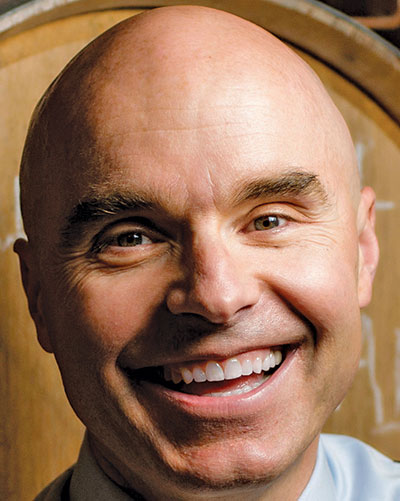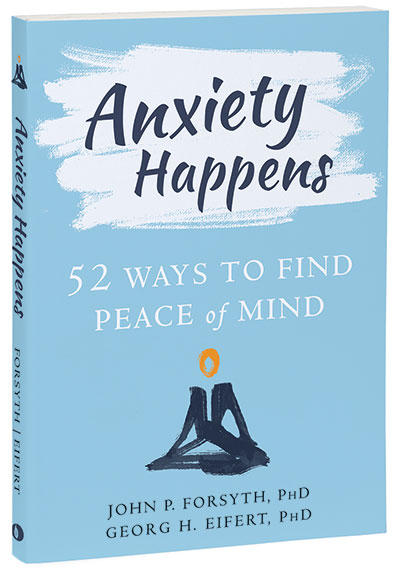Deflecting the Pink Elephant

If you’ve ever felt “stuck on autopilot,” UAlbany psychology professor John P. Forsyth, Ph.D., has some advice for you: “Connecting with your deeper feelings about what’s important to you” makes for a happier, more successful life.
Forsyth, a licensed psychologist who directs the University’s Anxiety Disorders Research Program, has felt “stuck,” too. As a young adult expected to join his parents’ business, he took the real-estate exam and failed. “My heart wasn’t in it,” Forsyth recalls.
Instead, he worked for two years as a psychology technician at Boston’s National Center for PTSD – Behavioral Sciences Division, where he “developed a passion for research.” He later earned a Ph.D. in clinical psychology from West Virginia University and completed a pre-doctoral residency at the University of Mississippi Medical Center’s Department of Psychiatry and Human Behavior, where he served as chief resident.

Many of us “go through the motions, doing what we think we should be doing, or ought to be doing,” notes Forsyth, co-author, with Georg Eifert, Ph.D., of Anxiety Happens: 52 Ways to Find Peace of Mind. “If left unchecked, we can end up living an idea of a life that is not our own, and eventually find ourselves headed down a path of regret and despair. To get a different outcome in life, we have to be willing to change what we’re doing.”
Forsyth observes: “Once humans develop the capacity for language and cognition, we very quickly lose contact with the present moment. We over-identify with thoughts and take them literally, even if they don’t serve us well: ‘I’m stupid.’ ‘I can’t do this.’ ‘I’m not good enough.’”
It’s important instead to focus on “the things that matter to you in life,” rather than “trying to change what you think and feel. The more you try to avoid a feeling or memory, the more you’ll experience it. There’s just no healthy way not to think a thought without thinking it. It’s like trying not to think about a pink elephant. You end up with pink elephants stuck in your head.”
We give too much credence to “the inner critic” – thoughts, judgments, evaluations, and so on. “We miss that we are historical creatures. Our nervous systems are additive, not subtractive. So, what you and I think, feel, remember now is a mix of everything that has come before,” explains Forsyth.
Forsyth suggests a few ways to confront painful memories and anxiety:
- Put your thoughts on paper. Whatever occurs to you – even if it’s painful, like fears about intimacy or social anxiety – “write it down.”
- Ask if a particular thought is helpful or not in the service of the life you wish to create. Don’t try to avoid negative thoughts: “Whatever goes [into our minds] stays in; that’s how our brains work. All thoughts will come and go; they need not be trusted or believed.”
- Be more open about what you want to become and do. “There is no escaping pain. In turning away from pain, we turn away from our lives. Confronting pain openly is how we navigate and move with obstacles and problems in life.”
- Step back to gain perspective. “When you become more present and more open in your emotional life, you’ll connect with your values, and anxiety and depression will lessen.”
- Treat yourself with “a heavy dose of kindness and compassion, the way you would treat a family member, friend, or beloved pet. Science shows that self-compassion is both a skill and a powerful antidote to needless suffering. This skill will help you feel better and live better.”
Currently on sabbatical, Forsyth will return to UAlbany in the fall. He regularly teaches the graduate course Adult Psychopathology and an undergraduate course,
Abnormal Psychology.
Link to John Forsyth’s webpage at www.drjohnforsyth.com.
Related Stories
Gifts at WorkAcclaimed Alumni Help Secure NYSWI’s Future
Two renowned UAlbany alumni – one a novelist, the other a screenwriter and producer – will ensure that audiences continue to enjoy New York State Writers Institute programs that bring celebrated writers and films to the Capital Region.
Gifts at WorkKeeping “the Educational Light” Burning
Daniel P. Nolan, B.S.'74 cites “the tremendous success of the University’s programs in basketball, lacrosse, soccer, and other sports” – and the resulting “increased pride of alumni” – as two reasons for making the donation.
Student ProfileBeing There for Others
Moises Urena, a former peer leader at the American Sign Language High School in downtown Manhattan, aspires to work in higher education one day.
